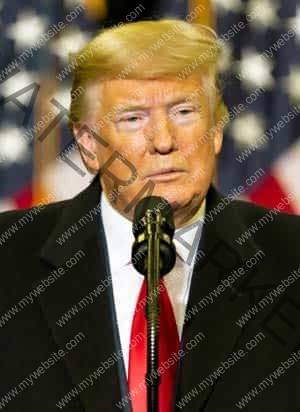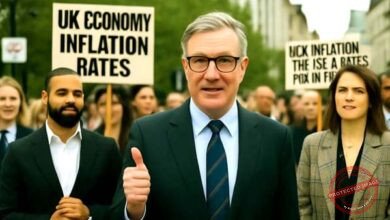
 India News Reporter Editorial. Donald Trump, originally known for his business dealings and television presence, made a dramatic entrance into American politics with his announcement of candidacy for the presidency in June 2015. Running as a Republican, Trump positioned himself as an outsider who could disrupt the status quo in Washington, D.C. His campaign capitalized on a potent mix of populism and nationalism, appealing to a segment of the electorate that felt overlooked by traditional politicians. His focus on issues such as immigration reform, trade renegotiation, and the promise to “Make America Great Again” struck a chord with many voters, leading to his eventual nomination in 2016.
India News Reporter Editorial. Donald Trump, originally known for his business dealings and television presence, made a dramatic entrance into American politics with his announcement of candidacy for the presidency in June 2015. Running as a Republican, Trump positioned himself as an outsider who could disrupt the status quo in Washington, D.C. His campaign capitalized on a potent mix of populism and nationalism, appealing to a segment of the electorate that felt overlooked by traditional politicians. His focus on issues such as immigration reform, trade renegotiation, and the promise to “Make America Great Again” struck a chord with many voters, leading to his eventual nomination in 2016.
Trump’s journey to the presidency was marked by a series of key milestones and controversies that would define his political identity. Notably, his victory in the 2016 presidential election against Democratic nominee Hillary Clinton was one of the most unexpected outcomes in recent American political history. Following his inauguration in January 2017, Trump’s tenure was characterized by significant decisions, including the withdrawal from the Paris Agreement, the implementation of travel bans targeting specific countries, and major tax reform legislation. Each of these actions generated substantial public discourse and polarized opinions across the nation.
Throughout his presidency, Trump faced numerous controversies- from his handling of foreign relations, particularly with Russia and North Korea, to his administration’s response to the COVID-19 pandemic. The latter part of his term was engulfed by the impeachment proceedings initiated by the House of Representatives, first for abuse of power and later for incitement of insurrection following the events of January 6, 2021. These events not only affected his presidency but also left a lasting mark on the political landscape of America, solidifying Trump’s position as a defining figure in contemporary politics.
Trump’s Post-Presidency Influence
Since leaving office in January 2021, Donald Trump has continued to wield considerable influence over American politics, particularly within the Republican Party. His ability to captivate attention and galvanize support among his base has remained unabated, showcasing a unique brand of political influence that few contemporary figures can rival. Trump’s interactions with his supporters, primarily facilitated through rallies and social media platforms, have solidified his status as a prominent figure in the political landscape.
Trump’s rallies attract large crowds, reflecting his enduring popularity among his devoted followers. These events not only serve as platforms for him to voice his opinions on current issues but also reinforce his connection with his audience, affirming their loyalty to his vision for America. Each rally tends to draw significant media coverage, thereby perpetuating his influence in shaping narratives within conservative circles. Furthermore, Trump has shown a keen ability to mobilize his base, often rallying them around key issues such as immigration policy, economic recovery, and critiques of the Biden administration.
Additionally, Trump’s strategic use of social media continues to play a crucial role in maintaining his relevance. Although he faced restrictions on major platforms following the Capitol riots in January 2021, he has continued to communicate directly with his followers through alternative means and his own platform, Truth Social. This direct line enables him to influence political discourse and rally support not only for himself but also for candidates he endorses.
Moreover, Trump’s endorsement of various Republican candidates has proven vital in primary races, often determining the success or failure of emerging political figures. His ability to sway voter sentiment reflects the lasting impact he has on the party. Overall, Trump’s post-presidency phase has demonstrated that he remains a key player in American politics, shaping the future of the Republican Party and the wider political landscape.
Key Issues Currently Surrounding Trump
The current political landscape in America is significantly influenced by the figure of Donald Trump, particularly regarding the various issues surrounding him. Trump is facing multiple investigations and lawsuits that have far-reaching implications for his political future and public image. The most prominent investigation pertains to his handling of classified documents after leaving the White House, which has led to scrutiny over potential breaches of national security. Legal experts are closely watching the outcomes, as they may set important precedents regarding the accountability of former presidents.
Moreover, Trump is also embroiled in civil litigation stemming from allegations of financial misconduct. These lawsuits, including claims of exaggerating the value of assets, could potentially affect his business ventures and fundraising capabilities. The results of these cases are likely to resonate in the court of public opinion, impacting his standing with both supporters and opponents. Additionally, there have been ongoing discussions surrounding Trump’s involvement in the events of January 6, 2021, adding another layer of complexity to his legal situation.
Public controversies also play a crucial role in shaping Trump’s political narrative. His rhetoric often incites polarized responses, especially regarding sensitive topics such as immigration, race relations, and foreign policy. These matters not only energize his base but also alienate certain voter demographics, which could be detrimental in upcoming elections. As Trump navigates these multifaceted issues, his ability to adapt and respond will significantly influence his political trajectory moving forward.
In light of these key issues, Donald Trump’s future remains uncertain. The interplay between legal challenges and public perception will continue to define his role in American politics as he seeks to maintain relevance amidst these ongoing controversies.
Public Perception of Trump in 2023
As we navigate through 2023, the public perception of Donald Trump remains a topic of significant interest within the political landscape of America. Recent polling data indicates a polarized view among American citizens, demonstrating both staunch support and intense criticism of the former president. A notable percentage of respondents express admiration for his policies during his tenure, particularly concerning economic measures and immigration policies. Conversely, a comparable segment of the population articulates discontent regarding his conduct and the controversies that have surrounded him.
The media plays a vital role in shaping the narrative surrounding Trump. Coverage tends to highlight both his rallies, where enthusiastic supporters gather, and the numerous legal challenges he faces, which, in turn, reflects the societal attitudes toward him. This duality in coverage can lead to the reinforcement of pre-existing beliefs, thereby exacerbating the divisions within American society. Supporters often view the media coverage as biased, which they believe aimed at discrediting Trump, while critics argue that the scrutiny is a necessary safeguard against potential abuses of power.
Furthermore, Trump’s continued influence within the Republican Party complicates public opinion. His endorsements have significant weight in primaries, shaping electoral outcomes across the nation. A faction of Republican voters remains unwaveringly loyal to Trump, viewing him as a champion of their values and voice in Washington. However, other segments of the party express a desire for a shift away from his contentious leadership style, advocating for a more traditional candidate. This divergence illustrates the complicated dynamics at play as Trump maintains his stature amidst ongoing debates regarding his impact on American politics.
Trump and the 2024 Presidential Election Race
As the political landscape in America continuously evolves, former President Donald Trump’s potential candidacy for the 2024 presidential election is a focal point of intense speculation and analysis. Following his term from 2016 to 2020, Trump remains a dominant figure within the Republican Party, influencing the ideologies and strategies of 2024 contenders. His decision to run again would undoubtedly redefine the Republican primary dynamics, shaping the trajectory of the election cycle.
In examining Trump’s campaign strategies, it is essential to note his unique ability to mobilize a substantial base of supporters. His approach often includes direct communication through social media platforms, as well as large-scale rallies that energize his followers. These approaches form a vital part of his campaign tactics, allowing him to resonate with voters on issues that matter most to them, such as immigration, economic policies, and perceived threats to American values. Furthermore, Trump’s messages often revolve around a populist agenda, which he effectively utilizes to differentiate himself from potential opponents within his party.
The Republican primary, anticipated to feature several candidates vying for nomination, could see Trump positioning himself against notable figures. Among these could be Florida Governor Ron DeSantis and former U.N. Ambassador Nikki Haley, both of whom have significant followings and political capital. Their respective platforms and contrasting styles may affect Trump’s decision-making and strategic campaigning as he seeks to maintain his front-runner status. The interplay between these candidates could lead to a contentious primary, with Trump’s past actions and ongoing influence play a crucial role in shaping the Republican electorate’s preferences.
Ultimately, Trump’s presence in the 2024 presidential election race signifies a pivotal moment for the Republican Party, potentially determining the nominee and influencing the party’s direction for years to come. The upcoming months will be critical as the primaries unfold, revealing much about the electoral landscape in America.
Impact of Trump’s Policies on Americans
Donald Trump’s presidency from 2017 to 2021 implemented a range of policies that have left a lasting impact on various segments of the American population. One of the most cited areas affected was the economy, where the administration’s decisions on tax cuts and deregulation aimed to stimulate growth. The Tax Cuts and Jobs Act of 2017, which significantly reduced the corporate tax rate, was intended to increase investment and subsequent job creation. While proponents argue that these measures led to a lower unemployment rate and increased consumer confidence, critics point to the growing income inequality and rising national debt as significant detractors from these gains.
Immigration policy during Trump’s term was characterized by strict measures, including the travel ban and family separations at the border. These actions polarized public opinion and have had significant repercussions, especially among immigrant communities. Families were torn apart, and fears surrounding deportation have persisted, dramatically affecting the lives of millions. This divisive approach has led to ongoing debates about what it means to be American and the fundamental values that define the nation.
Health care policy also transformed under Trump, as his administration sought to dismantle the Affordable Care Act. The emphasis was placed on lowering drug prices and increasing competition, yet millions remained uninsured, raising questions about accessibility and equity in health care. This fallout continues to be a point of contention in political discussions, shedding light on the larger issue of health care reform in America.
In the realm of foreign relations, Trump’s “America First” approach led to a reevaluation of longstanding alliances and trade agreements. While some applauded the renegotiation of NAFTA and the withdrawal from international agreements as means to prioritize American interests, others critiqued the adverse effects on global diplomatic relations. The implications of these policies are still prominent in contemporary political dialogues, as they raise essential questions about the direction of America’s foreign policy in a rapidly changing world.
The Role of Media in Shaping Trump’s Narrative
The media landscape plays a pivotal role in shaping public perception of political figures, and Donald Trump is no exception. Since his entry into politics, various forms of media have contributed to constructing a multifaceted narrative around him. Traditional media outlets, such as newspapers and television networks, have both supported and criticized Trump, leading to a polarized perception among the American populace.
On one hand, supportive media coverage has often emphasized Trump’s achievements and policies, focusing on economic growth and deregulation efforts that align with his base’s values. For instance, outlets sympathetic to his administration have extensively covered tax reforms and job creation initiatives, portraying Trump as a catalyst for positive change. These narratives resonate with his supporters, reinforcing their loyalty and shaping their views towards the President’s initiatives.
Conversely, critical media coverage has spotlighted Trump’s controversial statements and decisions, framing them within a broader context of political and social implications. This approach often emphasizes issues such as immigration policies, handling of the COVID-19 pandemic, and allegations of misconduct. Such reporting has contributed to a significant perception of Trump as a divisive figure, generating widespread debate and discourse across various platforms. Social media has amplified these discussions, allowing for real-time reactions and user-generated content that further complicates the narrative surrounding Trump.
The impact of social media platforms such as Twitter and Facebook cannot be overstated. They allow Trump’s supporters and opponents to engage directly and rally their narratives, creating echo chambers that reinforce existing beliefs. Misinformation, alongside polarized opinions, spreads rapidly, complicating the public’s ability to discern fact from fiction. Consequently, the media’s role in shaping Trump’s narrative is complex, marked by a constant battle between supportive and critical coverage that influences political discourse and public opinion in contemporary America.
The Future of Trump in American Politics
As the political landscape in America continues to evolve, the future of Donald Trump remains a subject of significant speculation and analysis. Trump, a pivotal figure in contemporary American politics, has not only galvanized a substantial portion of the electorate but has also solidified his status within the Republican Party. His influence, however, is currently shadowed by various ongoing legal challenges that could radically alter his political trajectory.
Legal issues have emerged as a central theme in discussions about Trump’s future. These challenges, spanning multiple jurisdictions and involving various allegations, pose serious implications for his political ambitions. Should these legal matters lead to convictions or significant penalties, they could inhibit his ability to run for office again or to maintain his position within party lines. However, Trump’s supporters often view these legal challenges as politically motivated, which may actually bolster his standing among certain segments of the electorate who believe he is being unfairly targeted.
Despite the potential hurdles presented by his legal situation, Trump continues to maintain a strong base of support among GOP members. The Republican Party, while facing internal divisions, has a substantial faction that remains loyal to Trump’s brand of politics. This loyalty could shape his future roles within the party and influence the nominating process for the 2024 presidential election. If he chooses to pursue another run, his candidacy could sway the party’s platform, pushing it toward more populist policies that reflect his rhetoric.
Moreover, there are various avenues through which Trump could remain engaged in politics, regardless of his legal predicaments or presidential aspirations. He could emerge as a significant influencer through endorsements of candidates or could take on a prominent advisory role within the GOP. With the emergence of newer issues on the political landscape, Trump’s opinions will likely retain relevance, potentially positioning him as a key figure in shaping party policies and strategies in the coming years.
Conclusion: The Lasting Legacy of Trump
The presidency of Donald Trump has undeniably left an indelible mark on American politics and society. His tenure, characterized by polarizing rhetoric and unconventional governance, has initiated a series of fundamental shifts that will be analyzed by historians and political analysts for decades to come. Under Trump’s leadership, the political landscape has undergone transformative changes impacting not only the Republican Party but the entire electoral landscape.
One of the most significant long-term consequences of Trump’s presidency is the alteration of party dynamics. His unique approach to campaigning often blurred traditional party lines, energizing a base that craved disruption from the political status quo. This shift has made the Republican Party more populist and less aligned with establishment conservatism. Future generations may consider this a pivotal moment that sparked a realignment in American political affiliations and loyalties.
Furthermore, Trump’s presidency has influenced the public’s perception of civic norms and democratic institutions. His approach to governance raised questions about the reliability of checks and balances, resulting in a more contentious political environment. As future citizens examine his legacy, they will likely grapple with the balance between populism and the more conventional democratic principles that have historically guided the United States.
In addition, issues exacerbated during his term, including immigration policies and race relations, will continue to unfold, prompting future generations to evaluate their efficacy and societal impact. The long-standing ramifications of Trump’s actions during critical moments, such as the COVID-19 pandemic, will also be scrutinized thoroughly.
Ultimately, the legacy of Donald Trump represents a complex interplay of advancements and setbacks in American politics. As future historians endeavor to unravel the intricacies of his impact, the ramifications of his presidency will remain a focal point for understanding the evolution of the current political landscape in America.










